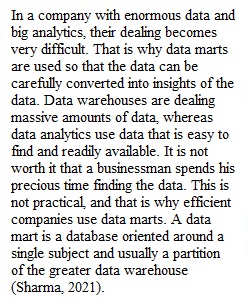


Q Please make corrections to the draft of your final project. Your final project must include the following elements: 1. Background of database – why you chose to design this particular database 2. Purpose of database 3. Business goals and rules for database 4. User requirements for database 5. Data requirements for database 6. Reporting requirements for database 7. Estimated project schedule and project costs for creating the database and populating it with data 8. Logical data model 9. Data dictionary for all tables in data model 10. SQL statements: - CREATE TABLE statements (for entities defined in model) - Minimum of two SELECT statements - INSERT, UPDATE, or DELETE statements for at least one table 11. Identify the database management system (DBMS) software that will be used for the database 12. Specify the hardware for storing your database 13. Create a basic database back-up and recovery plan that is consistent with the business goals Submit your assignment in MS Word format. Resources: These are the same resources used for Week 6 - Data Management Project: Rough Draft. • Textbook: Module 16 – Database Administration and Security • Video: Module 16 – Database Administration (2:36 min.) • PowerPoint: Module 16 Review charts Rubric Data Management Project - Final Rubric (2) Data Management Project - Final Rubric (2) Criteria Ratings Pts This criterion is linked to a Learning OutcomeCritical Thinking 20 pts Exemplary Main points are clear and well developed. Logical development is easy to follow. 18 pts Accomplished Main points are clear and well developed. Evidence and detail provide strong support for the data management project. 16 pts Competent Main points are clear and developed. Evidence and detail adequately support the data management project. 14 pts Developing Main points are clear but not developed. More supporting evidence and detail are needed. 20 pts This criterion is linked to a Learning OutcomeAnalysis and Interpretation 20 pts Exemplary Ability to analyze & interpret data is superior. 18 pts Accomplished Ability to analyze & interpret data is proficient. 16 pts Competent Ability to analyze & interpret data is basic. 14 pts Developing Ability to analyze & interpret data is emerging. 20 pts This criterion is linked to a Learning OutcomeAssignment Purpose 20 pts Exemplary Work stands out as exemplary, is accurately detailed. The data management project is appropriately addressed. 18 pts Accomplished Work is accurately detailed. The data management project is adequately addressed. 16 pts Competent Work reflects the assignment purpose. The data management project has most if not all of the components addressed. 14 pts Developing Work rarely reflects the assignment purpose. The data management project is only half completed. 20 pts This criterion is linked to a Learning OutcomeKnowledge of Content 20 pts Exemplary Exceeds requirements in demonstrating strong knowledge of content and depth. 18 pts Accomplished Knowledge of content and depth are appropriately reflected in document. 16 pts Competent Knowledge of content and depth are satisfactory. 14 pts Developing Some knowledge of content and depth are evident. 20 pts This criterion is linked to a Learning OutcomeStyle 20 pts Exemplary All components are identified successfully within the project. Assignment file follows the submission guidelines. 18 pts Accomplished Most components are identified successfully within the project. 16 pts Competent Some components are identified successfully within the project. 14 pts Developing Few or no components are identified successfully within the project. 20 pts Total Points: 100
View Related Questions